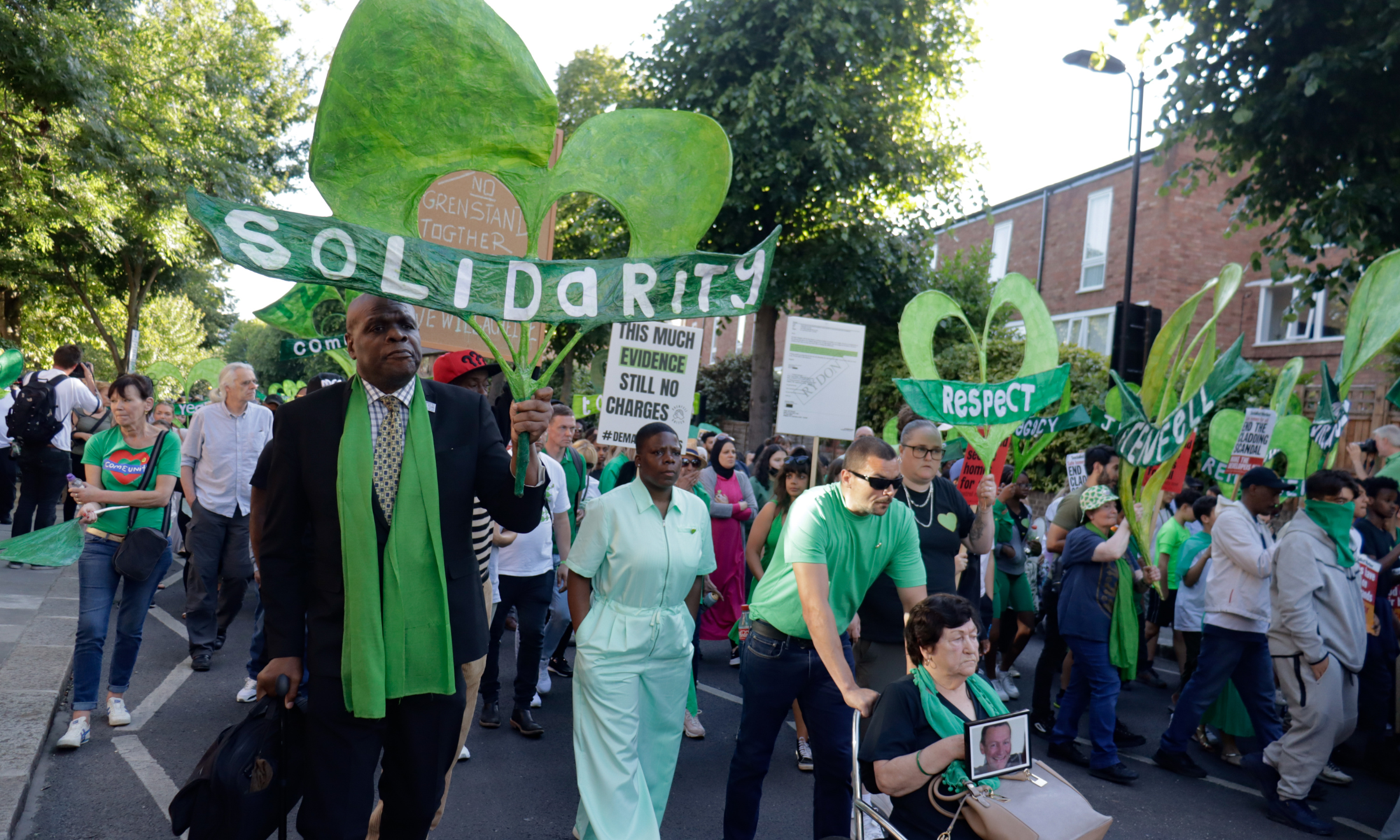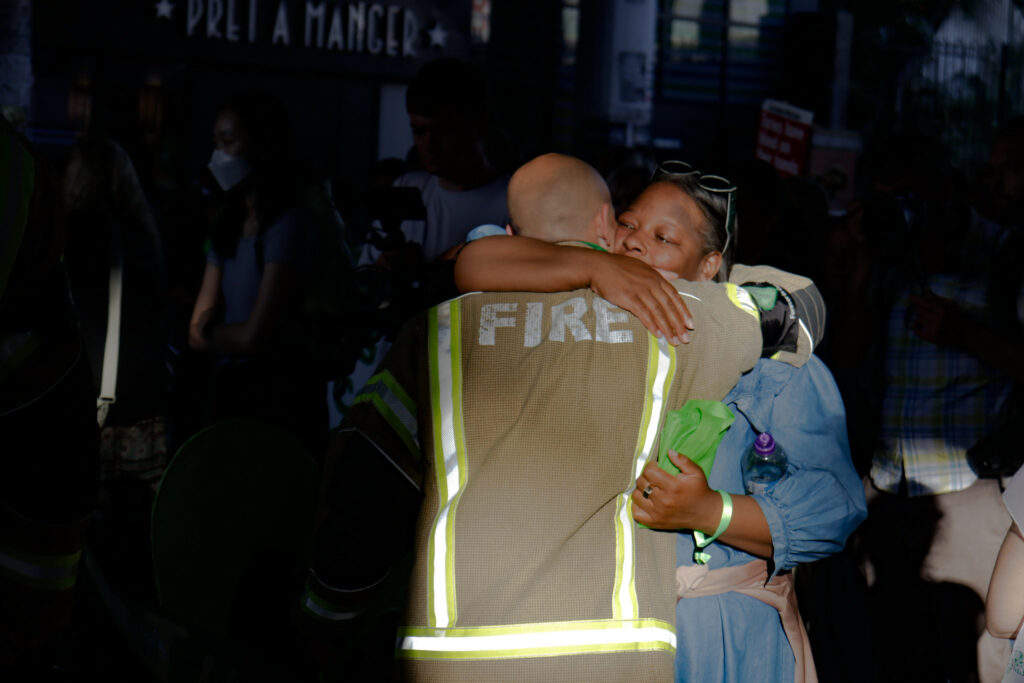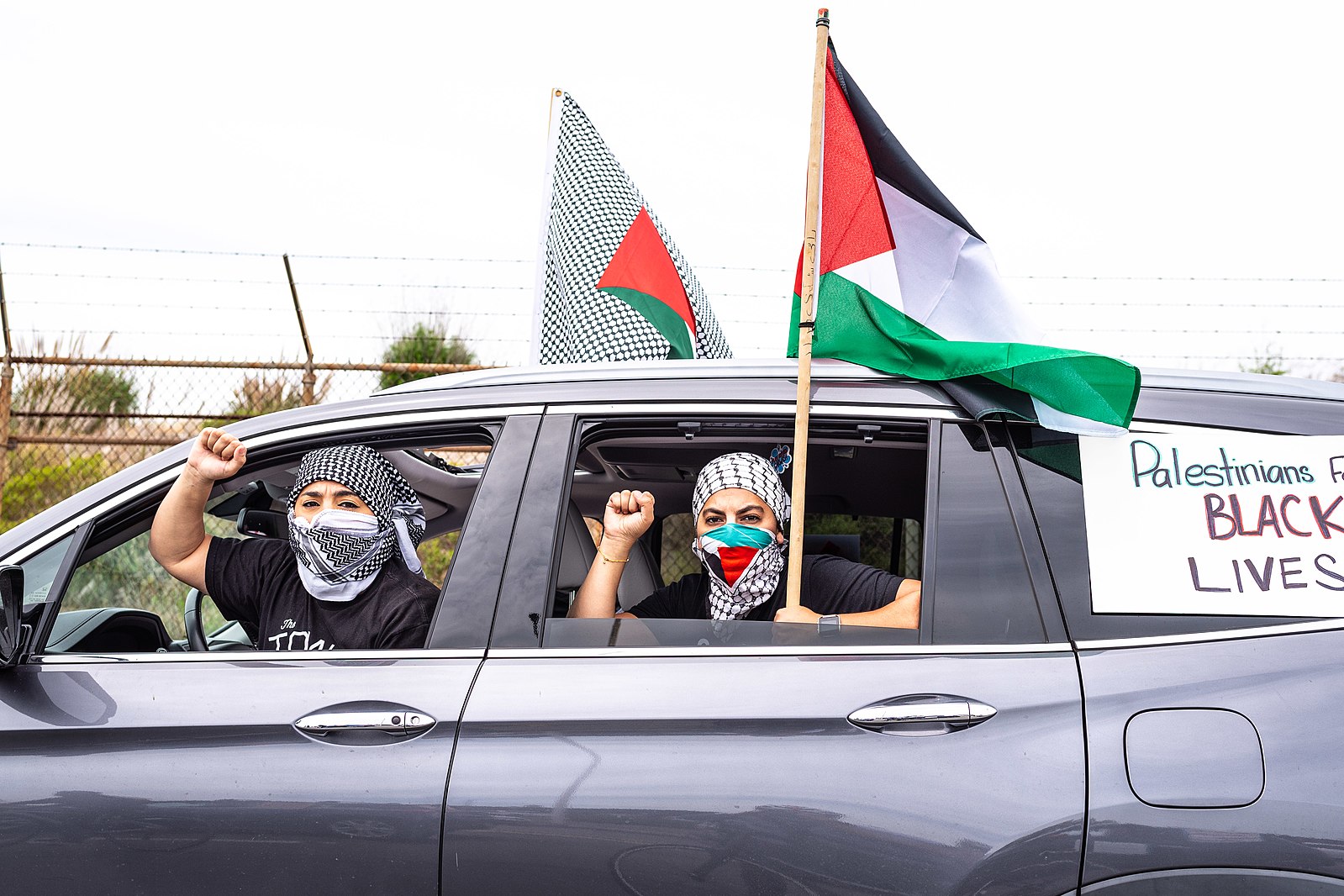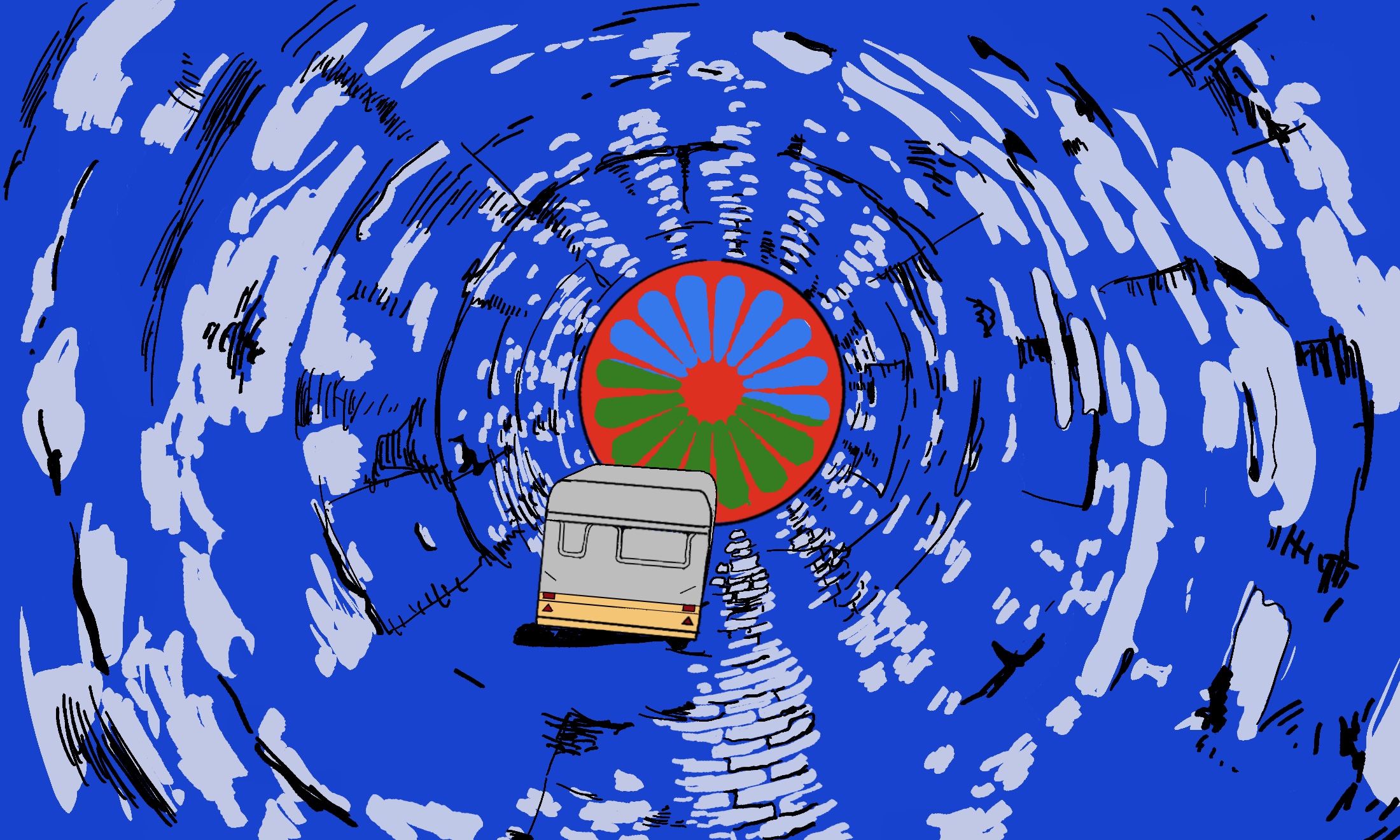
Flickr/Steve Eason
‘We were all robbed’: Grenfell’s community stands in solidarity on fifth anniversary
As survivors and the bereaved gathered to commemorate loved ones, they told a story of a community that continues to be failed by those in power.
Jeevan Ravindran
15 Jun 2022
Content warning: this article contains mention of death.
The air around Grenfell Tower is heavy, five years after the fire that claimed the lives of 72 residents. It’s heavy with the tears of the families who have gathered at the site to mourn their loved ones, heavy with longing for all the lives that could have been, and heavy with the quiet strength of a community that is still confronting a disaster of unimaginable scale.
Jo is standing with her cousin before the memorial wall, pointing out the name of her boyfriend written on a small brown heart along with the other survivors – 72 names cushioned inside a larger one emblazoned with the words “Grenfell Forever”. But 63-year-old Raymond Bernard wasn’t known by that name, so she takes a pen and writes his street name underneath – Moses.
“He was a people’s person. Everybody knew Moses in Ladbroke Grove. Always smiling. Everybody loved him. He’ll be in there forever,” Jo says, with a hand on her heart. She and Moses share a son, who rushed to the tower on the night of the fire to look for his father. Jo believes it was the order given to residents to “stay put” that ultimately killed so many of them. She’s even inclined to believe rumours that the placement of flammable cladding intended to “get rid of people”.
Five years later, the grief still weighs heavily on the lives of the survivors and the victims’ families. Jo “cries every day, morning and night”, her cousin tells me, and even thinking about her birthday brings her to tears, because it reminds her of Moses’ death.
“I lost my loved one in June. My birthday’s in a week’s time,” Jo says, her voice cracking and tears streaming down her face. “We were all robbed. All the families were robbed.”
This is a story of how poorer communities, largely made up of people of colour, are being failed by those in power
Families are standing together in front of the memorial wall, looking at pictures of their loved ones. Others from the community and beyond are laying flowers and wreaths, and burning incense sticks. Further along, two people are hugging, their bodies heaving with emotion.
The ongoing Grenfell inquiry has said the fire was “inextricably linked with race”, with 85% of victims being people of colour – and this is reflected in the sea of faces. People of all races and religions have gathered to pay their respects, and the community’s faiths are beautifully intermingled in an interfaith service, with a stirring recitation from the Qur’an followed by a Christian prayer.
Ramla Hussein remembers the night of the fire very clearly. It was a long day during the month of Ramadan when she walked home from the masjid with one of the people who would die in the disaster later that night. She lived opposite the tower at the time, and ran to the site when she heard about the fire.
“When the police came, they pushed us back, but we shouted and screamed,” she says. “Until six o’clock in the morning we were here, just bewildered. We had no idea we were standing there and people were dying. I don’t think we will ever forget that. And today, that’s why I’m here to pay my respects. How can I not be here?”
One particular family stands out in her mind – the El-Wahabis. The family of five, with ages ranging from eight to 52, all died in the fire. The Hussein and El-Wahabi children went to the local Thomas Jones Primary School together, and a memorial stone for the family has been erected on the grounds.
“That particular family, all of them are gone,” she says. “And I used to blame myself, saying, we shouted, we screamed, why they didn’t hear us?”
“It’s been five years. Nothing has changed”
Like Ramla, 16-year-old Fergus remembers the fire “like it was yesterday”. I see him writing a message on the memorial wall to one of his classmates, 11-year-old Fatima Choucair who “smiled brightly every day” and died in the fire alongside the five members of her family.
“When you show up to that classroom, and there’s only three people inside that classroom, you think everyone’s gone,” he says of the day after the fire, although he later found out it was only Fatima from his class who had died, while another classmate was in a coma and eventually recovered. “And you can’t do anything about it. Apart from wait, wait helplessly while people are screaming.”
Fergus says he “struggled to breathe” in the immediate aftermath of the fire, and took a week off school to help the community. He attended therapy sessions provided for people affected by the fire, and says it still affects him today.
“To lose someone, it was shocking. It’s like a missing part in your body,” he says. “Not only that, this community, being a strong community as it is, you see faces every day. You say hi, you say good morning, you say, you alright? You don’t see those faces no more because they got taken from us.”
One survivor who’s watching the memorial service, a 62-year-old woman who did not wish to be named, said she initially felt guilty for making it out of the tower, because she “was alive and they were dead”. She moved into Grenfell in April 1993, when her daughter was just six months old. “Today in the morning, I said thank you to God because my daughter and I are alive,” she says. “We are lucky to be alive.”
“This much evidence. Still no charges”
The quiet mourning of Grenfell’s survivors and families has also given way to anger, which I see in this survivor’s face as she speaks of government denial and negligence. When Prince William and Kate Middleton lay a wreath on stage during the memorial service, someone next to me whispers, “What are they doing here? They caused this. If they’re here, at least give people some money.” People have not forgotten that at its heart, this is a story of how desperately poorer communities, largely made up of people of colour, are being failed by those in power who are meant to take care of them.
During the Silent Walk – a form of protest that has come to characterise commemorations at Grenfell – we move through the streets of Ladbroke Grove, holding up signs reading, “This much evidence. Still no charges,” on one side, while the other side bears incriminating emails from a number of building companies – Kingspan, Rydon, Arconic and RBKC among them – that proves a painful truth. This could all have been prevented.

The heavy air follows us on the walk, as we pass by houses that serve as a stark reminder of life in this borough, where the rich thrive in beautiful flats along the main street while the poor die in tower block fires. The silence is broken only by applause for the “Grenfell heroes” – the firefighters, who have formed two orderly lines underneath the flyover, their helmets in front of them and their faces expressionless. Some hold green hearts reading “Change” as people clap and cheer on their walk past. The only other sound is a quiet murmur, as people say to one another, “It’s been five years. Nothing has changed.”
At the memorial wall, I talk to Marion and Mary Telfer, two sisters who lost their aunt, Mary Mendy, and their cousin, Khadija Saye, in the fire. Khadija was a 24-year-old artist who had just exhibited her work at the Venice Biennale when she died, and Mary was a carer.
“I put the TV on and I just screamed,” Marion says, recalling the night of the fire. “I used to live here when I was little, so I could literally look at the fire and just say, that’s the sitting room, that’s the bedroom.” Her sister Mary remembers reading a status Khadija posted on Facebook, calling for help. Like Jo, they believe the order to stay put was a death sentence.
Khadija’s friend, Layla Ali, also remembers reading that status, replying but never hearing back. When I ask her how she remembers Khadija now, she says it’s “her smile”.
“She was just such a magical person. She was one of the best people I knew,” Layla says, beginning to cry. “Our science class was so big in secondary school that we used to get moved to one side of the classroom where we happened to be out of view of the teacher. And one lesson we got a bit bored and decided to do an acapella/science-equipment rendition of ‘Bohemian Rhapsody’. And it was one of the best science classes I’ve ever had.”
“I won’t stop until someone goes to prison, or someone is held accountable for what they’ve done”
Marion
Five years after Grenfell, there’s been little progress. The cladding used on the building that caused the fire to spread so rapidly was finally banned this month on new buildings, but there are more than 10,000 existing buildings that still use it. The Grenfell inquiry continues, and has so far largely been a story of passing the blame. Nobody has yet been held accountable. Even if they are, it could be years before they are brought to justice – if ever.
“It doesn’t surprise me,” Layla says of the long wait, adding that she wants to see those responsible face the same accountability as criminals. “And I kind of feel like as long as justice is the end result, then I’m happy to wait as long as it takes.”
Others are angry that it’s taking this long. “It’s like we keep shouting, but they’ve got earplugs in,” says Fergus, who blames the government. “They don’t hear anything we say.”
“They have no idea how much it’s actually impacted us,” Mary says. “It’s actually ruined our lives, literally. I find it hard to sleep, I’m depressed and I can’t get away from it – I’ve tried. But I’ve learned to just deal with it now.”
For Marion, it’s the memory of the aunt who raised her that keeps her fighting for justice. “For me, everything I am is because of her. From the minute I was born, she raised me, she took care of me. She did everything for me. She changed my life more than I could ever have imagined. For me, my aunt is nothing but the greatest. And Khadija was like a little sister because we used to walk to school together.”
The Grenfell Tower looms large in the background of her words, covered with white sheeting that masks the charred remains underneath. Huge green hearts are positioned at the top, with the words reading “Grenfell. Forever in our hearts.” And these are not empty words – they are words written on the faces of the people here today, in their tears, their silence, and the strength of their community.
“I lost something really great, something that I can’t replace. And she never met him,” Marion says, gesturing to her young son. “I will always fight for my aunt because I know she would fight tooth and nail for me. And I won’t stop until someone goes to prison, or someone is held accountable for what they’ve done.”
Our groundbreaking journalism relies on the crucial support of a community of gal-dem members. We would not be able to continue to hold truth to power in this industry without them, and you can support us from £5 per month – less than a weekly coffee.

Britain’s policing was built on racism. Abolition is unavoidable

How Pakistan’s Khwaja Sira and transgender communities are fearing and fighting for their futures

Their anti-rape performance went viral globally. Now what?





